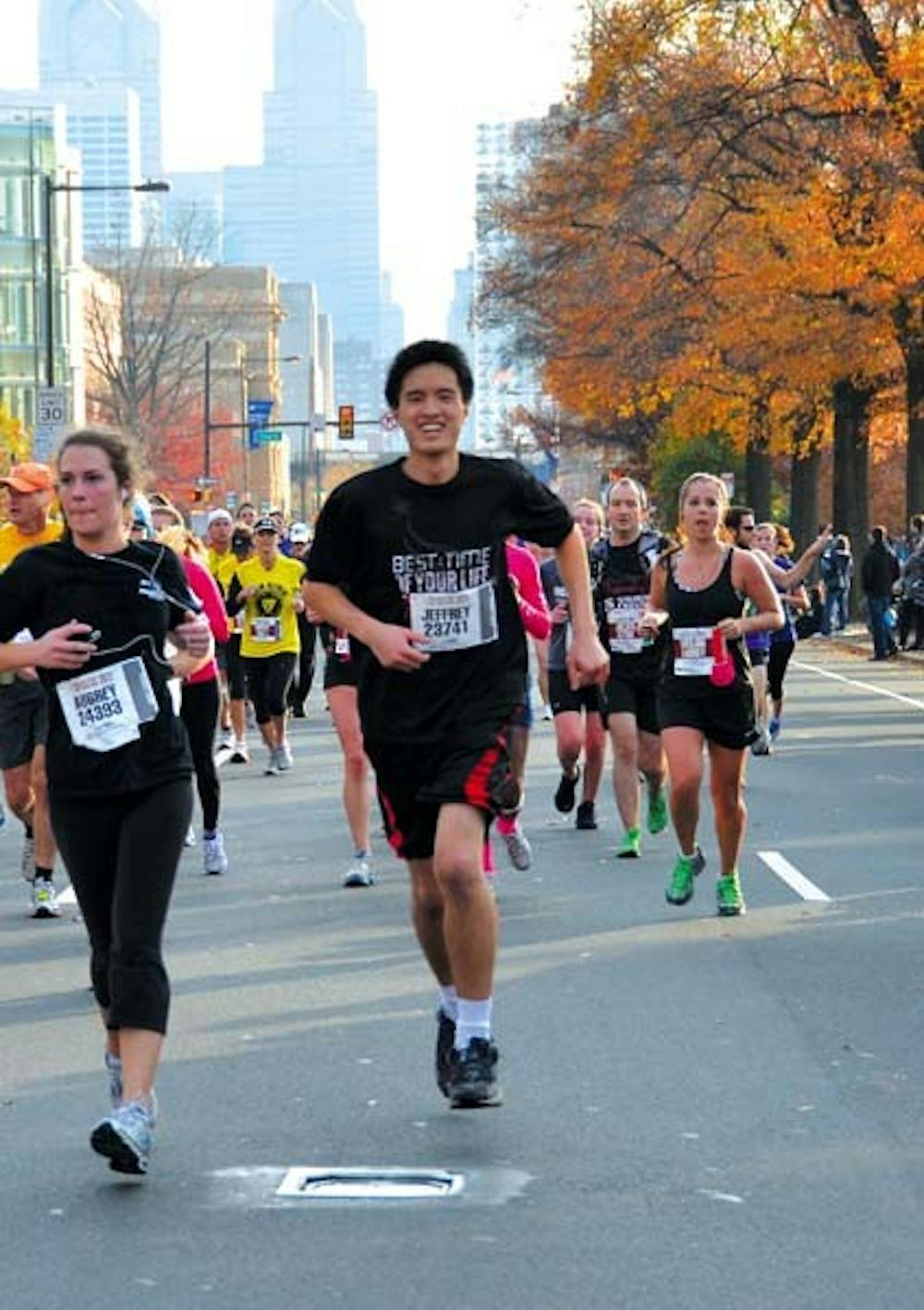
Jeffrey Lee runs in the Philadelphia Half Marathon on Nov. 20, 2011. Just after crossing the finish line, the Nursing and Wharton student died. The cause of his death will likely remain unknown.
Credit: Courtesy of the Lee FamilyAlmost a year and a half has passed since Jeffrey Lee died after running a half marathon, and his cause of death remains a mystery.
It’s likely one that will never be found.
Lee, a Nursing and Wharton dual degree student who would have graduated from Penn last spring, collapsed after crossing the finish line of the Philadelphia Half Marathon on Nov. 20, 2011 and died shortly after being taken to Hahnemann University Hospital. He was 21.
The official diagnosis was hypertrophic cardiomyopathy — a disease of the heart and one of the most common reasons for sudden cardiac arrest occurring in young athletes. It causes the heart to grow in size and disrupts the organ’s typical functions.
But an autopsy report, obtained by The Daily Pennsylvanian through Jeffrey’s 27-year-old older brother Matthew Lee, reveals Jeffrey’s heart weighed 410 grams at the time of his death — not much more than the 390 grams that would be characteristic for someone of his size.
“Such an enlargement could easily be found in someone who exercises regularly,” Michael Fishbein, professor of pathology and medicine at UCLA, in a separate review of the autopsy report. “In such individuals, the heart can enlarge slightly in response to the increased work load of exercise.”
Fishbein, one of the nation’s leading specialists in cardiology and pathology, conducted his own examination of the autopsy slides following the recommendation of Matthew’s cardiologist, William Mandel, and found no evidence supporting the hypertrophic cardiomyopathy diagnosis.
“There are other inherited disorders that can result in sudden cardiac death,” Fishbein wrote, suggesting channelopathies — diseases which deal with a problem in protein regulation — could have been the cause. In either case, the ailments often run in families, and Fishbein recommended Matthew be screened.
Per the Health Insurance Portability and Accountability Act, Fishbein could not comment directly on the matter.
Matthew was screened, and no evidence of hypertrophic cardiomyopathy or channelopathies was discovered. Still, Matthew wonders if doctors even knew what they were looking for in the first place, especially considering that his brother’s case remains unresolved.
“What did cause it? Could something happen to me because of that?” Matthew, speaking on behalf of the Lee family, said. “It’s really hard to say, if it was something rare like one of the channelopathies.
“I checked out, but did I really check out? Do we just not have the tests for it? I don’t know. If it was something more definitive, I could look more into it … but at this point I just don’t have any answers.”
The fact that Jeffrey’s cause of death cannot be determined is an added strain on those who were close to him.
“It’s much harder to find closure,” Matthew admitted.
In the struggle to attain closure, the family has compiled a book in Jeffrey’s memory of reflections and anecdotes from his friends, family and acquaintances.
“Basically one of the things I heard in the aftermath is that he never really talked too much about himself and that a lot of people didn’t know that much about Jeff’s life before he came to Penn,” Matthew said. “So we thought what better way to remember him than by bringing together the stories?”
They have also founded a scholarship fund, working with Jeffrey’s friends and cooperating with the University, intended to be given to a Wharton or Nursing student who “best exemplifies [Jeffrey’s] commitment to service and generosity toward others.”
Jessica Shin, a 2010 Penn graduate and friend of Jeffrey’s, and several other friends came up with the idea and approached the University about a month after Jeffrey’s death.
“When Jeff passed away, I didn’t really know what I wanted to do to remember Jeff but I wanted to do something,” Shin said. “I thought it would be nice to do the scholarship in his name.”
Last year, Penn even counted donations to the scholarship as contributions toward the Penn Fund.
“Unfortunately we haven’t met the $75,000 goal,” Shin said. “But the effort is actually still continuing.”
Although the case of Jeffrey Lee is a very exceptional one — he was the first person to die in the history of the Philadelphia half marathon — runners must be aware of the risks they are undertaking when putting themselves through a 13.1- or 26.2-mile trial.
Studies have determined the risk of dying in a marathon is merely one per 100,000, a view with which John Vasudevan, assistant professor of clinical physical medicine and rehabilitation at the Perelman School of Medicine, agrees.
“Most collapses that happen after the finish line are typically not cardiac arrest,” he said. “It’s when they pass out in the middle of the race that’s the most concerning scenario.”
But Jeffrey’s case is unusual, possibly unique.
Runners need to take precautions such as having yearly physicals and proceeding with caution if there’s a family history of sudden death or cardiac illness.
Yet sometimes, as in the case of Jeffrey Lee — who did undergo annual physicals and had no family history of heart problems — there is little that can be done to prevent it.
“It is good to have people … be warned about what could happen if they run marathons, especially if they haven’t done it before,” Matthew said. “The risk is always there — it’s good to know what you’re getting into.”
Those who wish to make a donation to the Jeffrey Lee Memorial Scholarship fund can do so by going here.
The Daily Pennsylvanian is an independent, student-run newspaper. Please consider making a donation to support the coverage that shapes the University. Your generosity ensures a future of strong journalism at Penn.
DonatePlease note All comments are eligible for publication in The Daily Pennsylvanian.





